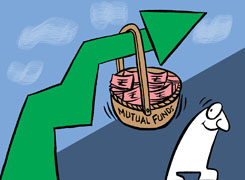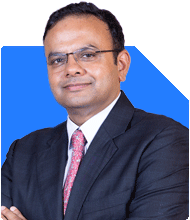Need Expert Advice?Our Gurus Can Help

Ramalingam Kalirajan5367 Answers |Ask - Follow
Mutual Funds, Financial Planning Expert - Answered on Jul 05, 2024
Asked on - Jun 09, 2024Hindi

Young Investors (20s and 30s)
Advantages
Long Investment Horizon: They can invest for a longer period, allowing more time to benefit from the power of compounding.
Higher Risk Appetite: They can afford to take more risks and invest more in equity funds for higher returns.
Strategy
Focus on equity mutual funds for aggressive growth.
Diversify with a small percentage in debt funds for stability.
Middle-Aged Investors (40s and 50s)
Advantages
Stable Income: They usually have a stable income, allowing for consistent investments.
Balanced Approach: They can balance growth and safety in their portfolio.
Strategy
A balanced portfolio of equity and debt funds.
Consider hybrid funds for a mix of growth and stability.
Senior Investors (60s and Above)
Advantages
Experience: They have more experience and understanding of market dynamics.
Wealth Preservation: They focus more on preserving wealth and generating income.
Strategy
Higher allocation to debt funds for safety.
A smaller portion in equity funds for moderate growth.
Key Considerations
Risk Tolerance: As you age, your risk tolerance generally decreases. Adjust your portfolio to reflect this change.
Investment Horizon: Shorter investment horizons require safer, less volatile investments.
Income Needs: Seniors may prioritize income-generating funds over growth-oriented ones.
Final Thoughts
Age should not deter you from investing in mutual funds. The key is to align your investment strategy with your financial goals, risk tolerance, and investment horizon. A Certified Financial Planner can help tailor a portfolio to suit your needs, regardless of age.
Best Regards,
K. Ramalingam, MBA, CFP,
Chief Financial Planner,
www.holisticinvestment.in
Best Regards,
K. Ramalingam, MBA, CFP,
Chief Financial Planner,
www.holisticinvestment.in
Ramalingam Kalirajan5367 Answers |Ask - Follow
Mutual Funds, Financial Planning Expert - Answered on Jun 07, 2024
Asked on - Jun 07, 2024Hindi
Ramalingam Kalirajan5367 Answers |Ask - Follow
Mutual Funds, Financial Planning Expert - Answered on Jun 07, 2024
Asked on - Jun 07, 2024Hindi
Ramalingam Kalirajan5367 Answers |Ask - Follow
Mutual Funds, Financial Planning Expert - Answered on May 24, 2024
Asked on - May 20, 2024Hindi

Let's delve into the advantages and disadvantages of holding Mutual Funds (MFs) in Demat form versus physical possession to help you make an informed decision.
Understanding Demat Accounts
Demat Account Advantages
Convenience: Demat accounts offer a single platform to hold various financial securities, including stocks, bonds, and mutual funds.
Electronic Transactions: Allows for easy buying, selling, and transferring of mutual fund units, eliminating paperwork and manual processes.
Demat Account Disadvantages
Annual Charges: Demat accounts typically incur annual maintenance charges, adding to the overall cost of holding investments.
Transaction Charges: Each transaction (buying, selling, or transferring units) attracts transaction charges, increasing the cost further.
Opting for Physical Mutual Funds
Advantages of Physical Mutual Funds
No Annual Charges: Unlike Demat accounts, physical mutual funds do not entail annual maintenance charges, reducing overall expenses.
No Transaction Charges: Physical mutual funds eliminate transaction charges associated with buying, selling, or transferring units.
Conclusion: Which Option to Choose?
Given the disadvantages associated with Demat accounts for holding mutual funds, opting for physical possession seems more advantageous in the long run.
Recommendation
Considerations for Holding Physical Mutual Funds
Convenience: Physical mutual funds offer ease of ownership without the hassle of account maintenance charges or transaction fees.
Cost-Efficiency: By avoiding annual charges and transaction fees, you can minimize expenses and maximize returns on your investments.
Simplicity: Holding physical mutual funds simplifies your investment portfolio management and reduces the administrative burden.
Making an Informed Decision
While Demat accounts offer convenience and electronic access to financial securities, the associated costs may outweigh the benefits, especially for mutual fund investors.
Seek Professional Advice
Consult with a Certified Financial Planner (CFP) to assess your individual circumstances, risk tolerance, and investment objectives. A CFP can provide personalized guidance and recommend the most suitable investment approach aligned with your financial goals.
Best Regards,
K. Ramalingam, MBA, CFP,
Chief Financial Planner,
www.holisticinvestment.in
Best Regards,
K. Ramalingam, MBA, CFP,
Chief Financial Planner,
www.holisticinvestment.in
Ramalingam Kalirajan5367 Answers |Ask - Follow
Mutual Funds, Financial Planning Expert - Answered on May 20, 2024
Asked on - May 05, 2024Hindi

Understanding the Concerns
Investing in manufacturing-related mutual funds entails exposure to companies operating in sectors like automobiles, capital goods, and industrials. These sectors are susceptible to economic cycles, global trends, and regulatory changes, which can impact their performance.
Genuine Concern for Safety
Your concern about the safety of investments is valid, especially when considering high-risk sectors like manufacturing. It's crucial to assess the risk-return trade-off before making investment decisions.
Analyzing Risk Factors
Manufacturing sectors are often influenced by factors such as:
Economic Conditions: Demand for manufactured goods is closely tied to economic growth, making these sectors sensitive to economic downturns.
Technological Disruption: Rapid technological advancements can disrupt traditional manufacturing processes, affecting companies' competitiveness.
Regulatory Changes: Government policies and regulations, such as environmental standards and trade tariffs, can impact manufacturing operations and profitability.
Benefits of Actively Managed Funds
While manufacturing mutual funds may carry higher risk, actively managed funds offer several benefits:
Expert Management: Skilled fund managers actively monitor and adjust the fund's holdings based on market conditions, potentially mitigating risks.
Diversification: Mutual funds typically invest in a diversified portfolio of stocks across sectors, reducing concentration risk.
Potential for Returns: Despite higher risk, manufacturing sectors can offer attractive returns during periods of economic growth and industrial expansion.
Cautious Approach
Considering the higher risk associated with manufacturing-related mutual funds, it's advisable to adopt a cautious approach:
Diversification: If investing in manufacturing sectors, diversify your portfolio across different sectors and asset classes to spread risk.
Regular Monitoring: Keep a close eye on the performance of your investments and review your portfolio periodically to ensure it remains aligned with your financial goals.
Seeking Professional Advice
Consulting a Certified Financial Planner can provide personalized advice tailored to your risk tolerance and investment objectives. A CFP can help you assess the suitability of manufacturing mutual funds within the context of your overall investment strategy.
Conclusion
While manufacturing-related mutual funds can offer growth potential, they come with higher risk. It's essential to carefully evaluate the risk-return dynamics and consider diversification strategies to manage risk effectively. Seeking guidance from a Certified Financial Planner can help you make informed investment decisions aligned with your financial goals.
Best Regards,
K. Ramalingam, MBA, CFP,
Chief Financial Planner,
www.holisticinvestment.in
Vivek Lala257 Answers |Ask - Follow
Tax, MF Expert - Answered on May 19, 2024
Asked on - May 15, 2024Hindi
Abhishek Dev57 Answers |Ask - Follow
Financial Planner - Answered on Sep 25, 2023
Asked on - Sep 25, 2023Hindi
Abhishek Dev57 Answers |Ask - Follow
Financial Planner - Answered on Aug 26, 2023
Asked on - Aug 24, 2023Hindi










